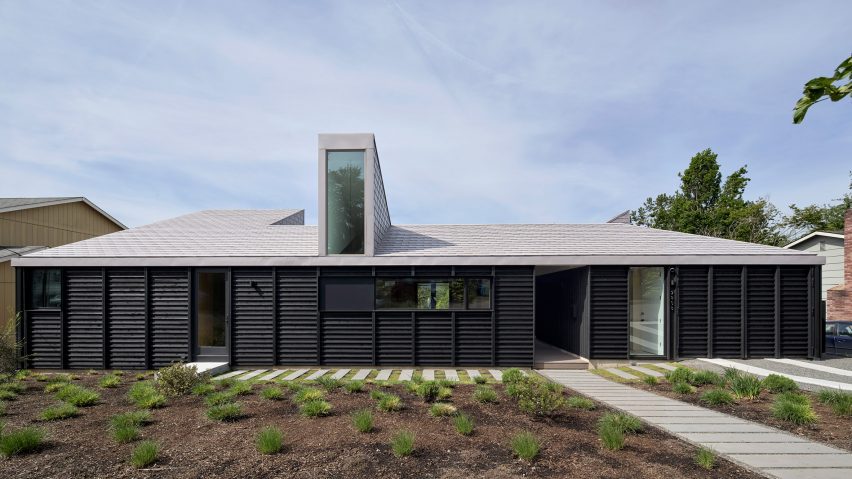Tall roof monitors lend a sculptural look to the Gradient House and Studio, which was designed by Oregon studio Linden Brown Architecture for the founders of a shoe design company.
The project was envisioned as a "live-work campus" for the owners of Studio Noyes, a creative agency focused on footwear.
The mixed-use building is located in the St Johns neighbourhood in North Portland and sits on a sloped parcel that was formerly occupied by a post-war dwelling. The old structures's concrete foundation and basement walls were retained.
Atop these remnants, the team constructed a 3,830-square-foot (356-square-metre) building that consists of two distinct but connected volumes – one serves as a residence, and the other contains a studio and garage.
A breezeway separates the two volumes that join to form an L-shaped plan.
The building's roof pitches and eave heights were influenced by the original house and residential context.
"The client was very intent on matching the scale of the building at the street," said local studio Linden Brown Architecture , which won a design award for the project from AIA's Oregon chapter.
"Though the new house and studio more than double the size of the original house, the scale of the surrounding neighbourhood is maintained."
Exterior walls are clad in stained cedar, arranged in a horizontal board-and-batten style.
Zinc-coated, aluminium shingles clad the building's roof. A series of light monitors usher in daylight and add a sculptural aesthetic.
Inside, one finds light-filled rooms, neutral colours and a mix of earthy and industrial materials, including maple, concrete and metal.
In the 2,200-square-foot (204-square-metre) home, the ground level contains communal spaces and a primary bedroom suite. The team placed a small loft above the bedroom, which is accessed via a staircase with tubular steel balusters.
The basement holds a guest room, media room, laundry and mechanical space.
The 1,400-square-foot (130-square-metre) studio features an open workspace, a kitchen, a lounge and a conference room. A 230-square-foot (21-square-metre) garage adjoins the studio.
Maple was used for studio's wall panelling and cabinetry. A vaulted ceiling rises to a height of 16 feet (4.9 metres), giving the space an airy feel.
Throughout the building, rooms are fitted with contemporary decor, some of it custom-designed by Linden Brown Architecture.
In the backyard, a series of rain gardens and seating areas are framed by board-formed concrete walls. The yard is designed to help manage rainwater.
"All of the stormwater created by the roof and impervious area of the project is directed to these court gardens, where the runoff gets slowed and filtered before returning to the city's storm system," the team said.
A gabion cage lines the rear of the property, which looks toward the Williamette River, St Johns Bridge and West Hills.
Other projects in Portland include a house by Kengo Kuma that draws upon ancient East Asian landscaping principles and an asymmetrical house by Beebe Skidmore that is meant to challenge "the aesthetic of typical family homes".
The photography is by Jeremy Bittermann.

